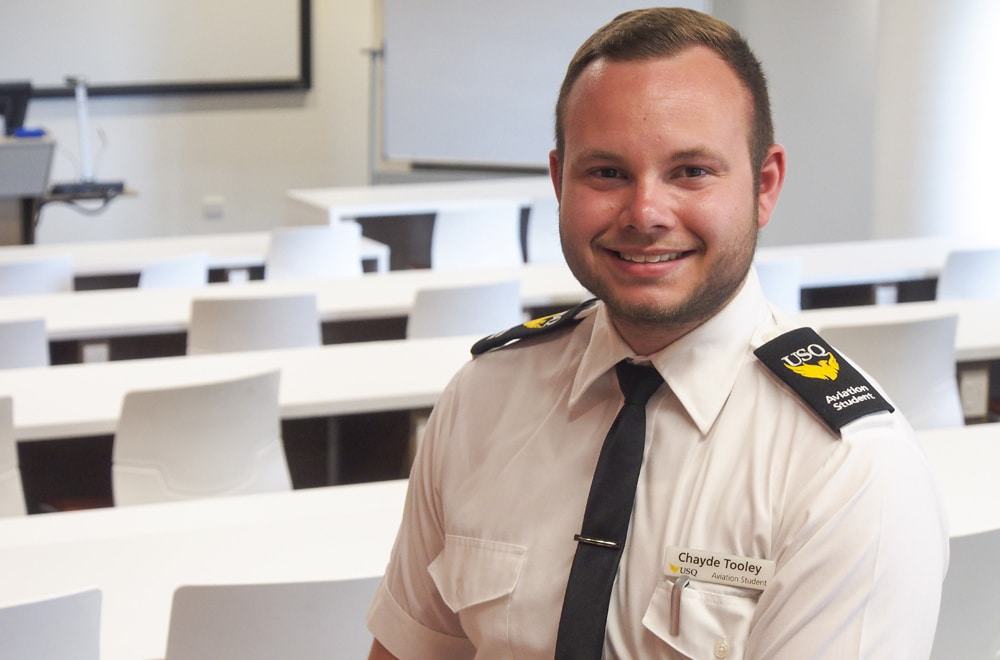Ipswich university student Chayde Tooley’s fascination with aircraft began early on.
As a four year old who lived a short distance from an airport in New Zealand, he would watch planes take off and land all day.
So it came as no surprise when, after graduating high school in 2015, Mr Tooley enrolled in a Bachelor of Aviation (Flight Operations) at USQ Springfield.
In his second semester of study and weeks away from starting his commercial pilot’s licence training, everything was going to plan.
That all changed in September 2016 when Mr Tooley was diagnosed with Ewing’s Sarcoma, a rare and aggressive form of bone cancer.
During the next 12 months, Mr Tooley underwent 51 sessions of chemotherapy and was told he would not be allowed to fly for at least five years.
“It hit me hard when I got the diagnosis and my class one medical certificate was taken from me, because I had not seriously thought about doing anything else but fly planes,” he said.
“I felt like my dream was being snatched away from me and it was heart breaking.”
Despite the devastating diagnosis, Mr Tooley refused to let the cancer stop him from pursuing his dreams.
Chayde Tooley loves working for Qantas.
Chayde Tooley’s mates at USQ helped support him through tough times.
He continued to study full-time during treatment and switched from the Flight Operations major to Aviation Management to get a broader understanding of the industry.
The switch proved fruitful, with Mr Tooley obtaining an internship at Qantas’ catering centre at Brisbane Airport.
“One of the best things about working at an airport is I get to learn about the operations involved in getting the planes into the air,” he said.
“There is so much that goes on that no-one thinks about or is aware of.
“The other great thing is I get to speak with cabin crew and pilots on board airplanes each day.
“The way I look at it, every person I speak to becomes one of my connections. If I can make a good impression with them, they will hopefully tell the right people and that will help me when it comes time to find a pilot role or management role.”
Mr Tooley, who 16 months after being diagnosed with cancer is in remission, is entering his final year at USQ.
What is Ewing sarcoma?
Ewing sarcoma is a type of tumor that forms from a certain kind of cell in bone or soft tissue.
Ewing sarcoma may be found in the bones of the legs, arms, feet, hands, chest, pelvis, spine, or skull. Ewing sarcoma also may be found in the soft tissue of the trunk, arms, legs, head and neck, abdominal cavity, or other areas.
Ewing tumors often occur in teenagers and young adults.
What are the symptoms?
These and other signs and symptoms may be caused by Ewing sarcoma or by other conditions. Check with your child’s doctor if you see any of the following in your child:
- Pain and/or swelling, usually in the arms, legs, chest, back, or pelvis (area between the hips).
- A lump (which may feel soft and warm) in the arms, legs, chest, or pelvis.
- Fever for no known reason.
- A bone that breaks for no known reason.
How is it diagnosed?
A range of tests that examine the bone and soft tissue can be used to diagnose and stage Ewing sarcoma. They include, but are not limited to, an MRI, CT scan, PET scan, bone scan, x-ray and blood count.
What treatments are available?
Treatment may include chemotherapy or surgery. Treatment is dependent on individual circumstances such as where the tumour is in the body, how large it is, patient age and health, etc.
Source: Rare Cancers Australia

